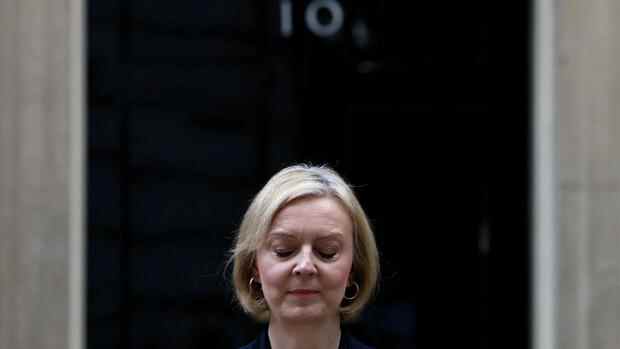Even the fifth largest economy in the world cannot be governed against the financial markets.
(Photo: Reuters)
Great Britain is considered the motherland of democracy. The chaos caused by Prime Minister Liz Truss, which eventually forced her to resign, is not only a tragedy for Britain, but also has five important lessons for other democratic nations.
First: Even the fifth largest economy in the world cannot be governed against the financial markets. It was the flight of international investors and the resulting rise in interest rates on British government bonds and the fall of the pound that forced Truss to make a 180-degree turnaround in its financial policy.
It has so far been the fate of poorly governed emerging economies that financial markets, often in conjunction with the International Monetary Fund (IMF), have enforced fiscal discipline. This time, a moderate market tremor and a blue letter from the IMF were enough to turn the economic policy agenda of a democratically elected prime minister upside down.
Thankfully, many will say given Truss’ outlandish idea of enforcing economic growth with tax cuts on credit. However, a bitter aftertaste remains: in the British case, the uncontrolled power of the markets may be a blessing. But what if the rationale for a change in economic policy is less clear? Not only governments, but also markets can be wrong, as the last two decades since the 2008 financial crisis have amply demonstrated.
Top jobs of the day
Find the best jobs now and
be notified by email.
Secondly: You can’t rule against the zeitgeist either. Probably the biggest mistake made by Truss and her economically liberal whisperers is to try to trim the state down at a time when many people are looking for the protection and care of the community in the face of geopolitical conflicts and enormous economic risks.
It is quite possible that the state pendulum will overshoot its target and that we will experience a countermovement in a few years. At the moment, however, it is important for every government to fill Karl Schiller’s old formula pragmatically and not ideologically: “As much market as possible, as much state as necessary.”
British Prime Minister Truss announces resignation
Third: The government chaos in London has led to a reassessment of Brexit, even in arch-conservative circles in Great Britain. Like all major industrial nations, the kingdom is suffering from external shocks in the energy markets and in the global supply chains. However, the Brexit effect has severely impacted the country’s economic shock absorbers. The enormous losses in trade with the former EU partners of around 20 percent alone speak volumes: the separation from the EU was the biggest mistake in recent British history.
For many Brits, Brexit appears in a new light – but there are no signs of a return to the EU
However, those who are now hoping that Britain will return to the EU after a possible change of government are likely to be disappointed again. There is still no political majority for such an about-face. The fact that hard Brexit supporter Rishi Sunak, who is also being talked about as a possible successor to Truss, is now on the left wing of the Conservative Party shows that an exit from Brexit with the Tories is not possible.
And the Labor Party, which leads by far in the polls, is keeping a low profile on this sensitive issue for electoral reasons. “We want to make Brexit a success,” was the last thing we heard from opposition leader Keir Starmer.
Fourth: The dramatic fall in power of the Tories in Great Britain shows that the conservatives lack a convincing political narrative, and not only in the island kingdom. The paternalistic or “compassionate” conservatism of Boris Johnson has failed in Britain, as has the libertarian radicalism of Liz Truss.
In Germany, too, the Union is looking for an alternative narrative that goes beyond the criticism of the mistakes made by the traffic light coalition. The situation is even worse in the US, where the Republicans have degenerated into a political sect of Trumpism, but thanks to the economic crisis they still have a good chance in next month’s midterm elections. But the same applies here: you are an anti-party without a political program that can win a majority.
Fifth: That doesn’t make the situation any easier for parties left of the political center. Like Emmanuel Macron in France or Olaf Scholz in Germany, a Labor Prime Minister Keir Starmer in Britain would have his hands full dealing with damage control. There simply isn’t enough money for visions that go beyond this – and there’s no support from the financial markets.
More: Liz Truss is still Prime Minister, but she has long since lost power.
